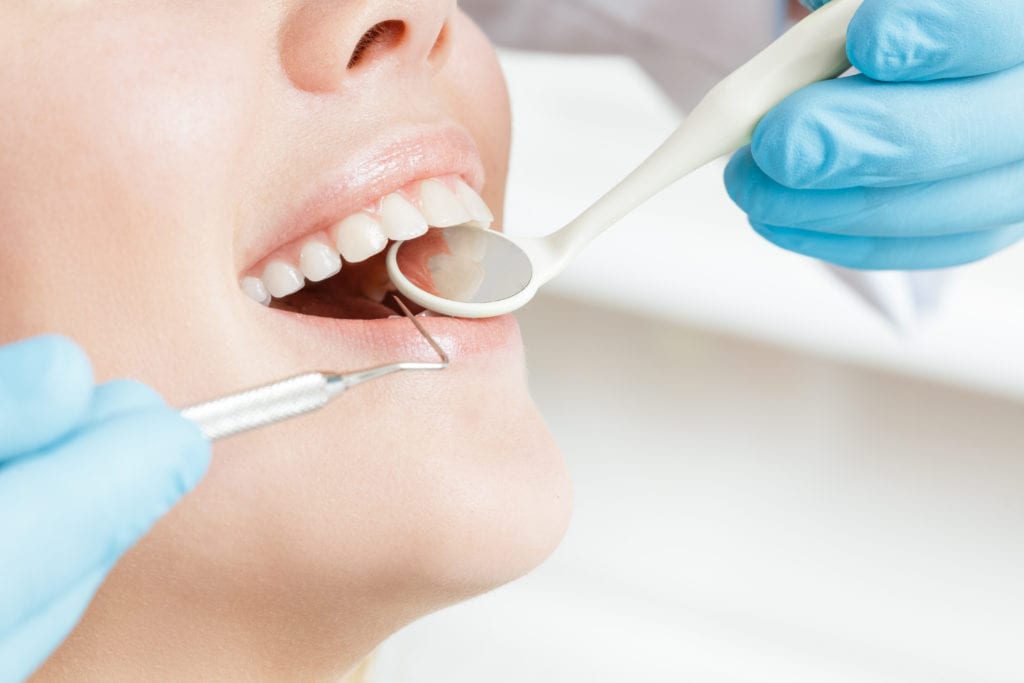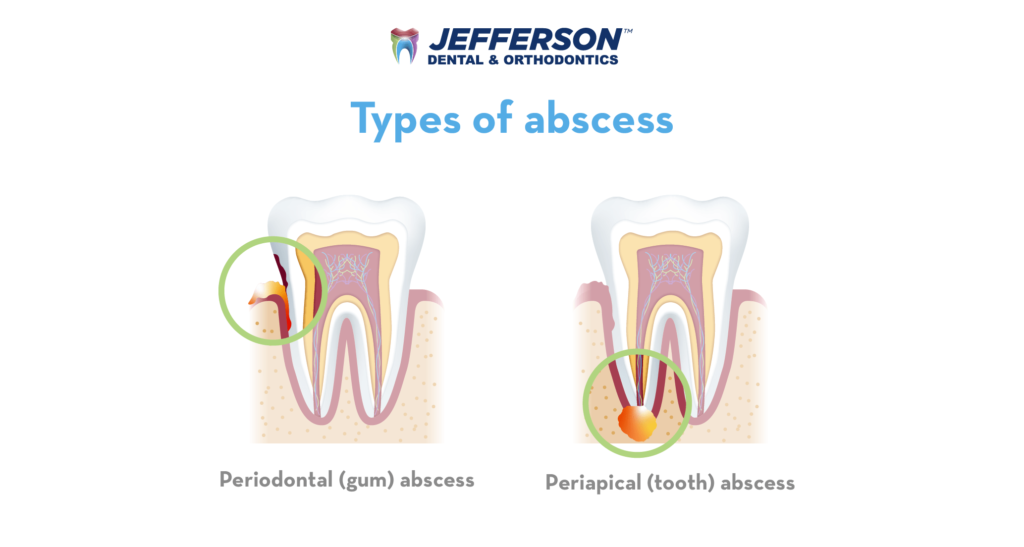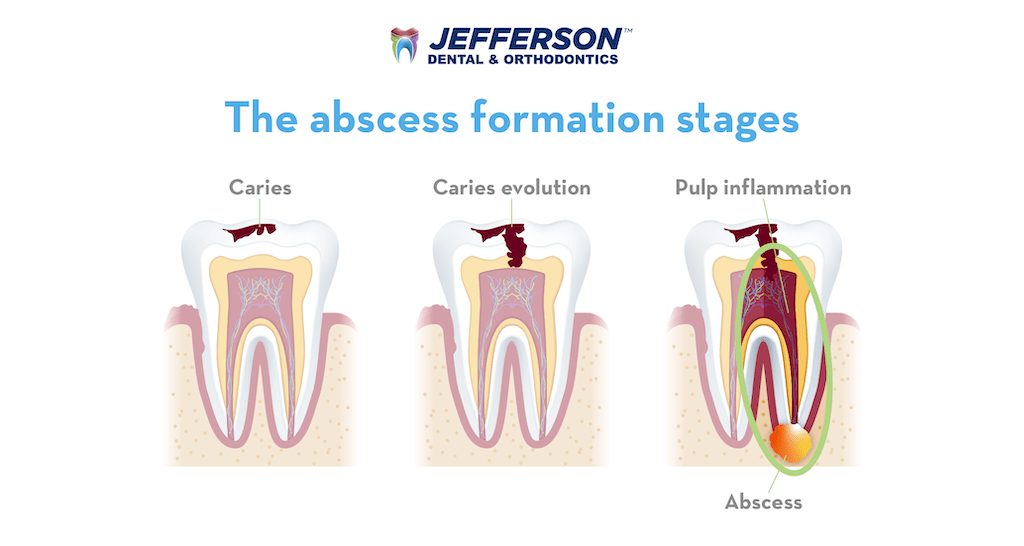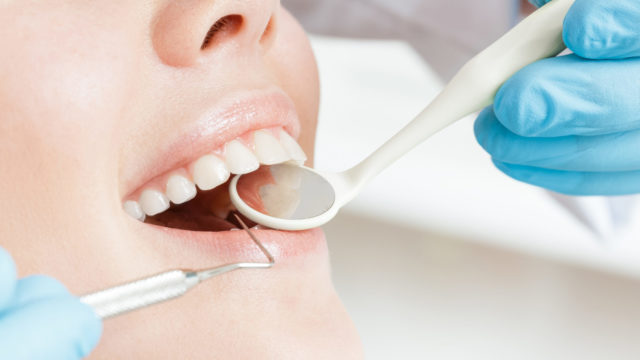
What is an Abscessed Tooth?
An abscess is a pocket of pus that occurs around a tooth, or in the gums, that is caused by bacteria. Abscesses can develop relatively quickly – within just a few days in some cases. If the infection isn’t treated properly it worsens and the bacteria can spread to other parts of your body.
Types of Tooth Abscesses & What Causes Them

There are two types of abscesses that form:
- Periodontal (gum) abscess is an infection between the tooth and gum. This type of abscess occurs due to infection that is already present in the gums or due to poor cleaning of the space between the teeth and gums.
- Periapical (tooth) abscess is an infection inside the tooth. It starts at the root of the tooth and spreads through the bone. A periapical abscess occurs due to an untreated dental cavity, injury, or prior dental work.
Read more: Toothaches: What Causes Tooth Pain and How to Treat It
Tooth Abscess Symptoms: What Does an Abscess Look and Feel like?

Most people feel some level of pain from an abscess, but it is possible to not have discomfort for months or even years. However, an abscess is typically swollen, irritated and filled with pus. Many people will likely feel pressure from the pus and irritation from the infection. The discomfort associated with an abscess may feel more like a throbbing sensation than sharp pain. Other symptoms may include:
- Fever
- Swollen neck glands
- Sensitivity to heat or cold
- Bad taste in the mouth
- Bad breath
Don’t leave an abscess without treatment! See your local Jefferson Dental & Orthodontics dentist if you feel one or more of these symptoms.
Is an Abscessed Tooth a Serious Condition?
An abscessed tooth can become serious without treatment. The abscess can develop into a fistula (a hollow tunnel that allows pus to drain) or completely rupture. In both situations, the infection spreads to other areas of your body, starting with your jaw, head, and neck. In these cases a dental cyst forms in the jaw bone and must be surgically removed.
When abscesses and dental cysts go untreated, they can ultimately cause life-threatening complications like sepsis (blood infection), spread of infection to soft tissues of the face (facial cellulitis, Ludwig’s angina), or the spread of infection to other areas of the body. Once the infection spreads beyond the mouth, the individual can experience brain abscesses, endocarditis (infection in the heart), pneumonia, or other serious complications.
Read more: Root Canal Causes, Treatment and Care
Can A Tooth Abscess Go Away on its Own?
Like other infections, a tooth abscess won’t resolve on its own. It requires treatment from a dentist. An abscess that is left untreated will sometimes create a hollow tunnel called a fistula that stems from the abscess through the bone or skin, allowing the pus to drain. A fistula is visible inside the mouth and looks like a pimple that is filled with pus. Even if the pus from a fistula drains releasing pressure, the infection still requires treatment or it will not resolve on its own.
Treatment for an Abscess Tooth
As you can see, it’s important to see your dentist as soon as possible if you suspect a dental abscess. The course of treatment will vary depending on the severity of the abscess. However, the general courses of treatment remain the same.
- For temporary pain relief until your appointment, you can take over-the-counter pain relievers.
- Your dentist will treat the infection with antibiotics and may recommend other topical or over-the-counter methods for alleviating pain.
- Abscesses often need to be drained. There are several methods for draining an abscess, including a small incision in the gums.
- Sometimes, an affected tooth needs to be removed (tooth extraction) and the area treated for infection.
- Root surgery may also be needed to remove infected tissue from the tooth root after the infection has been reduced.
Please note that, after a root canal or tooth extraction, you may need a crown or bridge to restore the functionality of a tooth. This means that you should expect additional follow-ups for this level of treatment.
Safe Home Remedies for Abscess Tooth
Certainly home remedies can help conditions, including abscesses. We would caution you to consult with Jefferson Dental & Orthodontics before attempting any home remedies to prevent worsening of the condition. That said, some popular home remedies for abscessed teeth include:
- A saltwater rinse can offer temporary relief and help your gums. Simply mix ½ teaspoon of table salt in a ½ cup of warm tap water. Rinse and swish the mixture around your mouth for at least two minutes before spitting it out. Try this three times per day.
- Baking soda is readily available and has antibacterial properties. Mix ½ tablespoon with a ½ cup of water and just a pinch of salt. Rinse and swish for several minutes, then spit it out. Repeat twice per day.
- Oregano, clove, and thyme essential oils have antibacterial and antioxidant properties, so they can help with swelling and pain. Mix a few drops of any of these oils in a carrier oil (like vegetable or coconut oil). Apply to a cotton swab and hold it on the affected area for a few minutes. Let the mixture sit for ten minutes before rinsing your mouth out with tap water.
- Cold compresses, like ice cubes in a towel, can help reduce swelling and pain.
- Fenugreek tea is available in the spice aisle of many grocery stores and can help with the healing process because of its antibacterial properties. Mix the ground spice with one cup of water and heat it. Apply to the affected area with a cotton ball or swab.
- Hydrogen peroxide fights bacterial infections, reduces plaque, and eases bleeding gums. Mix equal parts 3% hydrogen peroxide with water and swish around your mouth. Spit the liquid out and be careful not to swallow any.
- Oil pulling is an old method of treating many issues with the mouth. It involves using raw coconut oil, sesame oil, or olive oil first thing in the morning to clean your mouth. Put one tablespoon of oil in your mouth and swish it around for up to twenty minutes. Spit the oil in a garbage can (it will clog your pipes if you spit it in the sink).
- Garlic is a popular natural remedy that helps with pain and killing bacteria. Crush a garlic clove into a paste and rub it on the affected area.
Remember, a tooth abscess will not heal on its own. Even if you use safe home remedies to manage your pain and symptoms, you need to see your dentist as soon as possible to treat the abscessed tooth properly.
Abscess Tooth Prevention
The best way to prevent a dental abscess is with good dental care. Following a proper oral care routine is critical in maintaining your oral health.
- Brush at least twice per day for two minutes.
- Flossing daily to keep the spaces between teeth clear.
- Consider using an antiseptic or fluoride mouth wash.
- Replace your toothbrush every three months, after you’ve been ill, or if you notice the bristles are frayed.
- Eat a healthy, balanced diet with plenty of fruits and vegetables.
- Contact your dentist immediately if you experience a dental trauma resulting in a crack or chip, or if your tooth is dislodged. This sort of trauma can cause infection in a tooth that quickly becomes an abscess.
- Make sure you attend those twice-annual dental exams and cleanings.
Remember, your dentist can signal that there is an oral health condition that needs attention and can also help spot potential conditions throughout the body. Jefferson Dental offers convenient walk-in emergency dental care with evening and Saturday dentist appointments at dental offices near you.
Avoid an abscess with an exam and cleaning or treat a current abscess at Jefferson Dental & Orthodontics. Book an appointment today so we can take care of your oral health.
FAQS
Can an abscessed tooth heal on its own?
No, an abscessed tooth requires professional intervention to properly treat the infection.
Are there any long-term effects of untreated abscessed teeth?
Yes, untreated abscesses can lead to serious infections, impacting both oral and overall health.
Can I prevent tooth abscesses with a good oral hygiene routine?
Absolutely, maintaining a thorough oral hygiene routine is key to preventing tooth abscesses.
How can I alleviate the pain of an abscessed tooth at home?
Over-the-counter pain relievers and cold compresses can provide temporary relief.
Is it safe to rely on natural remedies for abscessed teeth?
While they can offer temporary relief, professional treatment is essential for complete healing.
How long can a tooth abscess go untreated?
If left without treatment, it has the potential to endure for multiple months or even years. Although it usually requires a really long time for a tooth infection to turn life-threatening, the potential does exist for a tooth infection to progress into sepsis when not addressed. Generally, this progression occurs over a span of a few months. Despite the temporary relief you might experience once the abscess ruptures, it’s important not to leave it there as the infection may continue.
~~~
Sources:
- https://www.medicinenet.com/abscessed_tooth_guide/article.htm#what_is_an_abscessed_tooth
- https://www.cuh.nhs.uk/addenbrookes-hospital/services/oral-and-maxillofacial-surgery-and-orthodontics/dental-cysts
- https://www.dentalcare.com/en-us/patient-education/patient-materials/why-are-regular-dental-visits-important




